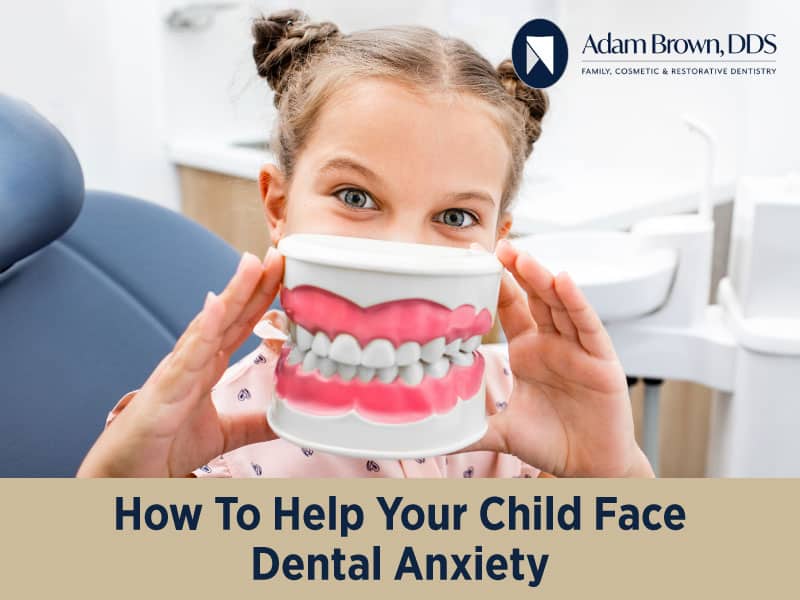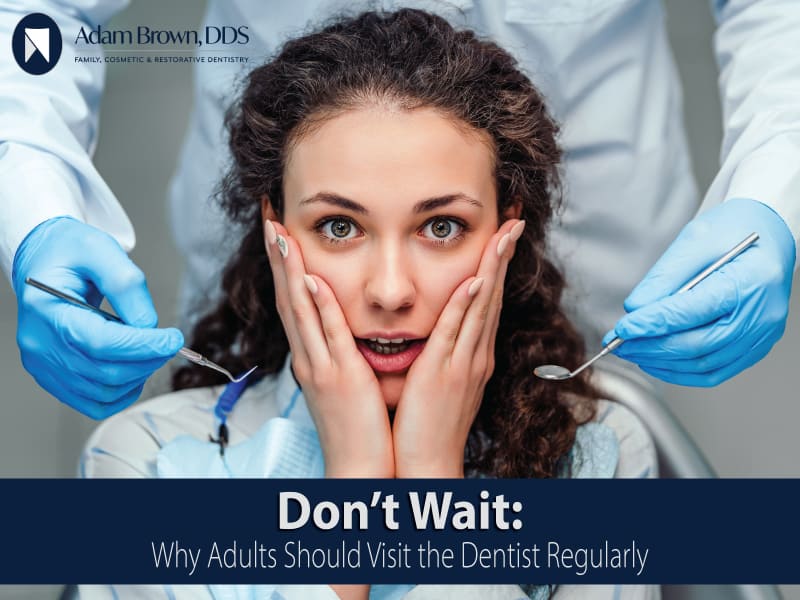How To Help Your Child Face Dental Anxiety

If you remember the anxiety you had in your youth on the way to your dental appointment, you’re not alone.
A good percentage of kids deal with dental phobia, with studies showing somewhere around a quarter of children will experience that fear at some point.
Still, getting your kids to their dental check-ups is a necessity for maintaining great adolescent health. Thankfully, Adam Brown DDS understands both the importance of check-ups and the need for a comfortable experience for their younger patients.
Tackling Dental Anxiety In Your Child
Addressing any deeply rooted fear your child has can feel like an uphill battle. Whether it’s convincing them that, no, there isn’t a monster under their bed, that the dark hallway won’t be a problem, or that the bug in their room won’t hurt them, you’ll find it hard to convey why there’s no reason for fear. Dental check-ups are not too different.
Here are some creative ways you can tackle that anxiety in preparation for your appointment:
Find A Smile That They Already Love
If their grandparent’s smile lights up a room, or maybe a beloved family friend’s grin, your child likely already can identify just how important a beautiful smile is.
Pointing out a role model’s smile is a way to show the importance of dental health in action, a move that can make that dental checkup seem really worth it.
Ease Them Into Meeting Their Dentist
Letting them know what they’re about to get into is a key way to ease your child’s concerns.
You can do this in a few ways: Showing a video of the office space, pictures of the staff, or the more comprehensive option, scheduling an in-person introduction before their appointment. You can contact Adam Brown’s DDS to schedule an early tour prior to your appointment, as a way to ease them into their dental appointment.
Arrive Early
While this may seem like the most simple of the options, it’s an extremely useful one. Getting there early can keep the stress of a rush from showing in your mood, preventing it from rubbing off on your child. That coupled with some time to adjust to the space can prove an effective tool in a stressful situation.
Take An Active Role
As a parent, you can really influence your child’s attitude towards their upcoming dental appointment. Changing the way you talk about dentistry can have a noticeable impact. Avoiding language like pain, needles, blood, or other potentially alarming aspects of dental language can lessen their stress.
In the same vein, altering your language to be something accessible and understandable for your children can help dispel some of the mystery around their appointment. While medical terms may be accurate, the unknowns associated with them can also do more harm than good.
Role-playing at home can also help mold expectations, a way to make the dental talk fun and involved, for both parent and child. Oftentimes the perception of what the dental appointment will be is the most troubling. Having a quick, pretend run-through is never a bad thing.
Reward Them
If your child has some concerns about their dental appointment, completing it can feel like a real achievement. It’s important to find ways to incentivize them to face their fears. A promise to visit their favorite restaurant, park, or another fun spot after the visit is one way to make the appointment seem more promising.
Adam Brown DDS understands the necessity of rewarding good dental habits. Hosting the “Cavity Free Club” as a way to let your kid pick out a fun toy after winning their battle against those pesky early cavities.
Validate but Move On
Validating fears around a necessary medical appointment may seem counterintuitive, but it can help more than just your child’s anxiety.
Your child’s fears are valid and instead of shutting them down, you can take a moment to reassure them. The fear they’re facing is real. Saying something like, “I know a lot of kids are scared of that too,” can make them feel heard.
But after that reassurance, it’s important to move on. Dwelling on comforting against the scary thing can actually make it a bigger cause of concern. Instead, talk about how you’ll work to make them brave and ready to take their dental appointment on.
Let Your Dentist Know
Your dentist is the most important partner throughout the whole process. Letting them know about dental anxiety, medical reactions (like fainting or gagging) allows them to provide the most comforting experience possible.
Adam Brown DDS has the necessary knowledge, experience, and professionalism to address dental anxiety and show just how positive an appointment can be.
Appointment Times Are Key
Last but not least, the way you schedule your child’s appointment can help tremendously.
Limiting the time between appointments can help bridge the gap in dental anxiety. Keeping your child out of a dentist’s office for a year or so can do some serious damage to the comfort you’ve built at a dentist’s office.
That time also allows for cavities and other dental problems to crop up, creating a more negative reason for an appointment, which can always create stress.
Why Your Child’s Check-Ups Are Vital
While tackling dental anxiety is one battle, you may be wondering, why are check-ups so important?
Early checkups and a diligent dental routine can not only prevent problems in the immediate future but also create a foundation of healthy hygiene for the rest of their lives.
After all, tooth decay is the most common disease present in children across the United States, with the CDC reporting that more than 40% of children will experience some degree of tooth decay before kindergarten.
The American Dental Association and the American Academy of Pediatrics say that every child should visit a dentist by age 1, or as soon as their first tooth shows.
Baby teeth are extremely important, allowing for proper speech development, teeth spacing, and chewing. Having a professional examine their growth can ensure those processes are happening in a healthy and sustainable way.
There are a few other vital benefits too.
This early head start can make the regular dental appointment more of a part of their life, addressing some of the root causes of dental anxiety.
It gives ample opportunities to check for systemic health issues. Many diseases can be identified by conditions of the mouth, which can give you some comfort knowing your child is healthy after their checkup.
All of this also creates a smile that your child can have confidence in, a reward that truly extends a lifetime.
Why Adam Brown DDS?
Adam Brown DDS is the perfect dental practice for your children’s dentistry needs. With a practice that looks at patients like family above all else, patients can come to Adam Brown DDS knowing they’ll receive not just a regular appointment but instead comprehensive generational dentistry.
While this blog can convey some of that, the testimonials and before-and-after photos from Adam Brown DDS patients will show the genuine quality you’ll receive.
And for the potential new customers reading this, they’re offering a New Patient Special for $65, which includes:
– Comprehensive Exam
– Full Dental Assessment
– Oral Cancer Screening
– Perio Evaluation (Gums)
– Evaluation of Jaw & Chewing Muscles
– Recording of Dental History
– X-Ray
– Digital Photos
So if you’re near Monroe and looking for a dentist that can do it all, from conquering dental anxiety, taking care of your child’s needs, or giving you a quality dental experience, Adam Brown DDS is the place for you.
J. Dalton George

